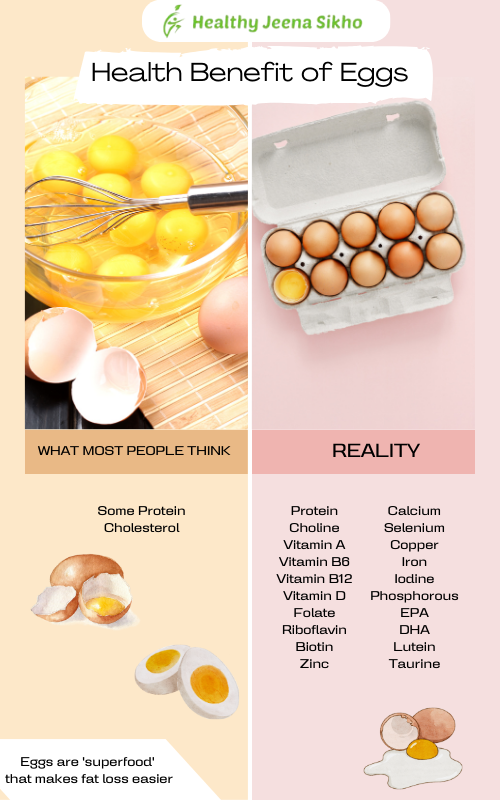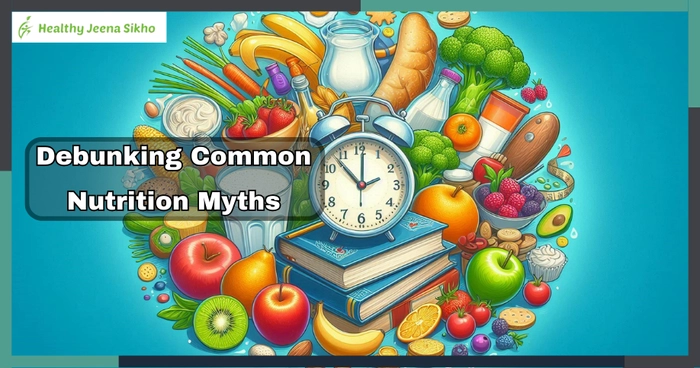Nutrition plays an important role in our overall health and well-being. However, with the abundance of information available today, it can be challenging to distinguish fact from fiction. Misinformation can lead to poor dietary choices and misconceptions about what truly constitutes a healthy lifestyle. In this blog, we'll debunk some of the most common myths related to nutrition which can help you make informed decisions about your diet and health.
Myth 1: Carbs Are Bad for You
The Truth: Carbohydrates are often vilified, especially with the popularity of low-carb diets. However, not all carbs are created equal. Carbohydrates are the body's primary source of energy as well as are essential for proper body functioning.
Understanding Carbs:
-
Complex Carbs: Found in whole grains, legumes, and vegetables, these carbs are rich in fibre and nutrients, providing sustained energy and promoting digestive health.
-
Simple Carbs: Found in sugary snacks and processed foods, these can lead to quick spikes in blood sugar levels and should be consumed in moderation.
Conclusion: Incorporating healthy, complex carbohydrates into your diet is essential for energy and overall health. It's all about choosing the right types of carbs rather than eliminating them entirely.
Myth 2: Eating Fat Makes You Fat
The Truth: Dietary fat has been misunderstood for years. While excessive consumption of unhealthy fats can lead to weight gain, healthy fats are crucial for various bodily functions.
Types of Fats:
-
Unsaturated Fats: Found in avocados, nuts, and olive oil, these fats support heart health and aid in nutrient absorption.
-
Saturated and Trans Fats: Found in processed and fried foods, these should be limited as they can increase the risk of heart disease.
Conclusion: Including healthy fats in your diet can promote satiety and support overall health. Focus on unsaturated fats and be mindful of your intake of saturated and trans fats.
Myth 3: Gluten-Free Diets Are Healthier for Everyone
The Truth: Gluten-free diets are considered essential for people with celiac disease or gluten sensitivity. However, for those without these conditions, eliminating gluten doesn't necessarily equate to a healthier diet.
Considerations:
-
Many gluten-free products are processed and may lack essential nutrients found in whole grains.
-
Unnecessarily restricting gluten can lead to deficiencies in fibre, vitamins, and minerals.
Conclusion: Unless medically necessary, there's no need to adopt a gluten-free diet. Emphasize whole, unprocessed grains for optimal health benefits.
Myth 4: Eating Late at Night Can Cause Weight Gain
The Truth: Weight gain is primarily influenced by the total amount of calories consumed versus calories burned, not necessarily by the time you eat.
Key Points:
-
Late-night snacking often involves high-calorie, low-nutrient foods which can contribute to weight gain.
-
Metabolism doesn't shut down at night; your body continues to use energy while you sleep.
Conclusion: Focus on what and how much you're eating rather than when you're eating. Opt for healthy snacks if you feel hungry late at night.
Myth 5: All Natural Sugars Are Better Than Processed Sugars
The Truth: While natural sugars found in fruits and honey contain additional nutrients, they are still sugars and should be consumed in moderation.
Understanding Sugars:
-
Natural Sugars: Found in whole foods like fruits, which also provide fibre, vitamins, and minerals.
-
Processed Sugars: Added to foods and drinks, offering little to no nutritional value.
Conclusion: Prioritize whole foods with natural sugars and limit intake of added sugars to maintain a balanced and healthy diet.
Myth 6: Supplements Can Replace Whole Foods
The Truth: Supplements are designed to complement the diet, not replace whole foods. Whole foods provide a complex array of nutrients that work synergistically for optimal health.
Considerations:
-
Whole foods offer dietary fiber and phytochemicals not found in supplements.
-
Overreliance on supplements can lead to nutrient imbalances and potential health issues.
Conclusion: Aim to meet your nutritional needs through a balanced diet rich in whole foods. Use supplements only when necessary and under professional guidance.
Myth 7: Eggs Raise Cholesterol Levels and Should Be Avoided

The Truth: While eggs do contain cholesterol, recent research shows that dietary cholesterol has a minimal effect on blood cholesterol levels for most people.
Health Benefits of Eggs:
-
Rich in high-quality protein, vitamins, and minerals.
-
Contains essential nutrients like choline, which supports brain health.
Conclusion: Eggs can be part of a healthy diet when consumed in moderation. Individuals with specific health concerns should consult healthcare professionals for personalized advice.
Myth 8: Detox Diets Are Necessary to Eliminate Toxins
The Truth: The body naturally detoxifies itself through the liver, kidneys, and other organs. Extreme detox diets can be unnecessary and potentially harmful.
Key Points:
-
Many detox diets are restrictive and lack essential nutrients.
-
Supporting natural detoxification involves maintaining a balanced diet, staying hydrated, and leading a healthy lifestyle.
Conclusion: Rather than relying on fad detox diets, support your body's natural cleansing processes through wholesome eating and healthy habits.
Myth 9: Eating Small, Frequent Meals Boosts Metabolism
The Truth: There is no significant evidence to suggest that eating multiple small meals throughout the day boosts metabolism more than traditional meal patterns.
Considerations:
-
Meal frequency should be based on individual preferences and lifestyle.
-
Focus on the quality and total calorie intake rather than the number of meals.
Conclusion: Choose an eating pattern that suits your body's needs and helps you maintain a balanced diet without overcomplicating meal timing.
Myth 10: Fresh Produce Is Always Better Than Frozen
The Truth: Frozen fruits and vegetables can be just as nutritious, if not more so, than their fresh counterparts, as they are often frozen at peak ripeness.
Benefits of Frozen Produce:
-
Longer shelf life and reduced food waste.
-
Convenience and availability year-round.
-
Preservation of nutrients through quick-freezing methods.
Conclusion: Incorporate both fresh and frozen produce into your diet to ensure a diverse and nutrient-rich intake, depending on availability and convenience.
Final Thoughts
Navigating the world of nutrition can be overwhelming with the myriad of myths and misconceptions circulating. By understanding the facts behind these common myths, you can make more informed and healthier choices for your lifestyle. Remember, balanced and varied eating habits, coupled with regular physical activity, are key components of maintaining optimal health. Always consult with healthcare professionals or registered dietitians for personalized nutritional advice.

